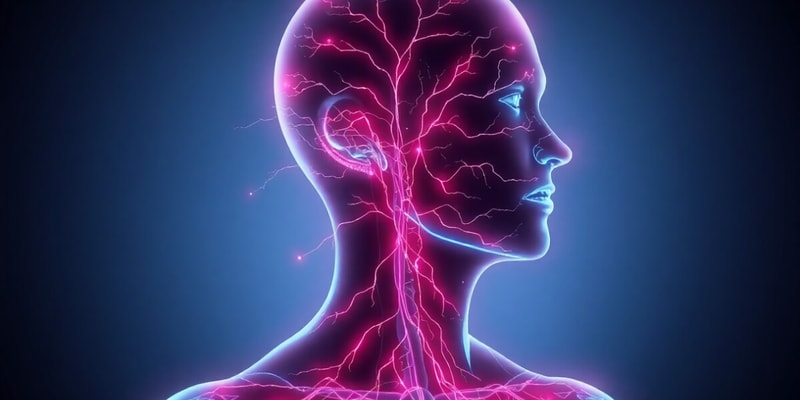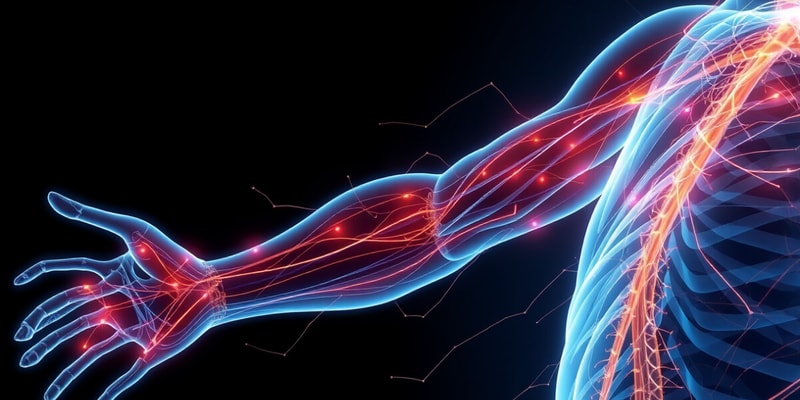Podcast
Questions and Answers
The main sensory receptor involved in muscle stretch is the ______.
The main sensory receptor involved in muscle stretch is the ______.
muscle spindle
The afferent nerve fibers associated with muscle spindles are called ______ afferents.
The afferent nerve fibers associated with muscle spindles are called ______ afferents.
IA
Motor fibers that innervate skeletal muscle are known as ______ motor neurons.
Motor fibers that innervate skeletal muscle are known as ______ motor neurons.
alpha
The effector organ in the muscle spindle reflex is the ______.
The effector organ in the muscle spindle reflex is the ______.
Signup and view all the answers
Muscle spindles are composed of intrafusal fibers that lie parallel to ______ fibers.
Muscle spindles are composed of intrafusal fibers that lie parallel to ______ fibers.
Signup and view all the answers
Types of intrafusal fibers include Nuclear ______ and Nuclear chain.
Types of intrafusal fibers include Nuclear ______ and Nuclear chain.
Signup and view all the answers
Gamma motor neurons innervate the ______ fibers of the muscle spindle.
Gamma motor neurons innervate the ______ fibers of the muscle spindle.
Signup and view all the answers
Primary sensory nerve endings are responsible for detecting the ______ of muscle stretch.
Primary sensory nerve endings are responsible for detecting the ______ of muscle stretch.
Signup and view all the answers
The reflex involving muscle spindles is an example of ______ feedback.
The reflex involving muscle spindles is an example of ______ feedback.
Signup and view all the answers
Spindle fibers take the ______ out of the spindle during co-activation.
Spindle fibers take the ______ out of the spindle during co-activation.
Signup and view all the answers
A reflex is an involuntary, stereotyped but coordinated response to a ______.
A reflex is an involuntary, stereotyped but coordinated response to a ______.
Signup and view all the answers
Reflexes can be classified as ______ or autonomic.
Reflexes can be classified as ______ or autonomic.
Signup and view all the answers
The components of a reflex arc include a center, afferent nerve, ______ nerve, receptor, and effector.
The components of a reflex arc include a center, afferent nerve, ______ nerve, receptor, and effector.
Signup and view all the answers
The stretch reflex can be exemplified by the knee ______.
The stretch reflex can be exemplified by the knee ______.
Signup and view all the answers
When a muscle is ______, the result is reflex contraction.
When a muscle is ______, the result is reflex contraction.
Signup and view all the answers
A reflex arc involves an orderly sequence of ______.
A reflex arc involves an orderly sequence of ______.
Signup and view all the answers
The ______ of the nervous system is frequently involved in reflex actions.
The ______ of the nervous system is frequently involved in reflex actions.
Signup and view all the answers
Reflexes may be classified into ______ or polysynaptic types.
Reflexes may be classified into ______ or polysynaptic types.
Signup and view all the answers
Muscle spindle function is influenced by gamma motor ______.
Muscle spindle function is influenced by gamma motor ______.
Signup and view all the answers
The reflex response is mediated through the ______ and spinal cord.
The reflex response is mediated through the ______ and spinal cord.
Signup and view all the answers
The GTO reflex is located at the junction between tendon and ______; very sensitive to muscle tension.
The GTO reflex is located at the junction between tendon and ______; very sensitive to muscle tension.
Signup and view all the answers
Stretch of muscle causes reflex ______, such as in the knee jerk reflex.
Stretch of muscle causes reflex ______, such as in the knee jerk reflex.
Signup and view all the answers
During muscle contraction, GTO detects ______ in the contracting muscle.
During muscle contraction, GTO detects ______ in the contracting muscle.
Signup and view all the answers
The sensory information from the GTO is carried into the spinal cord via ______ afferents.
The sensory information from the GTO is carried into the spinal cord via ______ afferents.
Signup and view all the answers
If tension in the muscle becomes excessive, it results in inhibition of the ______ muscle.
If tension in the muscle becomes excessive, it results in inhibition of the ______ muscle.
Signup and view all the answers
Muscle spindles provide continuous feedback about the muscle's ______ during contraction.
Muscle spindles provide continuous feedback about the muscle's ______ during contraction.
Signup and view all the answers
Flexion (withdrawal) reflex is the most powerful flexion reflex and takes ______ over others.
Flexion (withdrawal) reflex is the most powerful flexion reflex and takes ______ over others.
Signup and view all the answers
GTO reflex prevents excessive force generation by initiating reflex ______.
GTO reflex prevents excessive force generation by initiating reflex ______.
Signup and view all the answers
Stretch reflexes play an important role in the feedback control of muscle ______.
Stretch reflexes play an important role in the feedback control of muscle ______.
Signup and view all the answers
Flaccid paralysis occurs when there is a loss of ______ in the muscles, resulting in weakness.
Flaccid paralysis occurs when there is a loss of ______ in the muscles, resulting in weakness.
Signup and view all the answers
Study Notes
Reflexes Overview
- Reflexes are involuntary, stereotyped, coordinated responses to a stimulus.
- They involve an orderly sequence of events, called a reflex arc.
- Reflexes can be somatic or autonomic.
- Reflex arcs can be monosynaptic or polysynaptic.
Reflex Arc
- A reflex arc has five components:
- Receptor
- Afferent nerve (sensory)
- Centre (CNS or spinal cord)
- Efferent nerve (motor)
- Effector
Stretch Reflex
- The knee-jerk reflex is an example of a simple stretch reflex.
- When a muscle is stretched, it reflexively contracts.
- The muscle spindle is the sensory receptor for the stretch reflex.
- Type Ia afferents are the afferent nerve fibers in the stretch reflex.
- The alpha motor neuron is the efferent nerve fiber.
- The skeletal muscle is the effector.
- The stretch reflex is an example of negative feedback.
Muscle Spindle Structure
- The muscle spindle is a mechanoreceptor that responds to stretch and length changes in the muscle.
- It lies parallel to extrafusal fibers.
- The muscle spindle is composed of intrafusal muscle fibers.
- Intrafusal fibers have a non-contractile centre and contractile poles.
- There are two types of intrafusal fibers: nuclear bag and nuclear chain.
Muscle Spindle Innervation
- Gamma motor neurons innervate the intrafusal fibers of the muscle spindle.
- Type Ia afferents (primary sensory nerve endings) innervate both nuclear bag and chain fibers.
- Type Ia afferents detect the amount of muscle stretch and the rate of stretching.
- Type Ia afferents are rapidly conducting and myelinated.
- Type II afferents (secondary flower spray endings) innervate mainly nuclear chain fibers.
- Type II afferents detect the amount of muscle stretch.
- Type II afferents are slower conducting and also myelinated.
Gamma Motor Neuron Function
- Gamma motor neurons contract the intrafusal fibers of the muscle spindle, taking up slack and ensuring the spindle remains sensitive to stretch.
- Co-activation of alpha and gamma motor neurons allows the muscle spindle to remain functional during muscle contraction.
Golgi Tendon Organ (GTO) Reflex Arc
- GTOs are located at the junction between the tendon and muscle.
- GTOs are sensitive to muscle tension.
- GTOs lie in series with the muscle.
- Ib afferents are the sensory nerve fibers in the GTO.
- Ib afferents are large diameter and rapidly conducting.
GTO Reflex Function
When muscle tension becomes excessive, GTO stimulation leads to inhibition of the contracting muscle and reflex relaxation.
- The GTO reflex may be protective, preventing excessive force generation in a muscle.
- It is polysynaptic.
Muscle Spindles and GTOs Summary
- Muscle spindles and GTOs provide continuous feedback to the brain about muscle status.
- Muscle spindles and stretch reflexes are prominent in anti-gravity muscles, neck muscles, and muscles requiring fine control.
- Muscle spindles and GTOs prevent muscle overstretching and excessive force.
- Stretch reflexes contribute to posture and balance.
- GTO reflex dampens jerky movements.
Flexion (Withdrawal) Reflex
- It is also known as the crossed-extensor reflex.
- It is the most powerful flexion reflex.
- The path involves considerable divergence of one afferent.
Flaccid Paralysis
- Flaccid paralysis is a condition where muscles are unable to contract.
- This can be caused by damage to motor neurons.
Studying That Suits You
Use AI to generate personalized quizzes and flashcards to suit your learning preferences.
Related Documents
Description
This quiz covers the fundamentals of reflexes, including their involuntary nature and the structure of the reflex arc. You will learn about different types of reflexes, such as stretch reflexes, and the components involved in these neural responses. Test your understanding of how reflexes function and their physiological basis.




